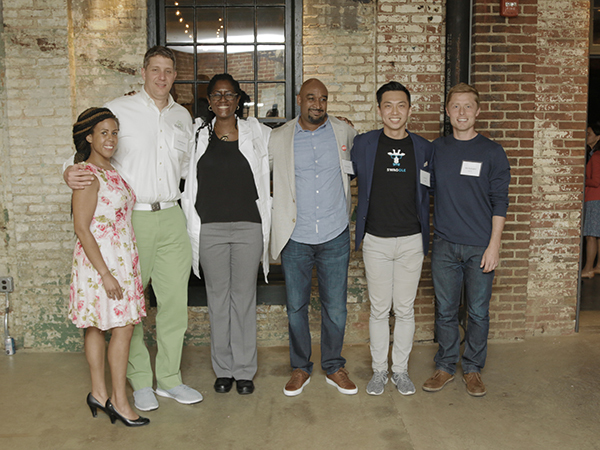
On April 19, the Emerging Technology Centers (ETC) hosted a Shark Tank style event in which six startup companies pitched their ideas in hopes of receiving $100,000. Now in its sixth year, Accelerate Baltimore—a collaborative initiative of ETC and the Abell Foundation—awards startups $25,000 in seed funding to bring their innovative ideas to fruition.
“ETC was a very well known incubator and co-working space that was really at the top of its game in 2012,” said Deb Tillett, president of ETC. “We reached out to the Abell Foundation and said, ‘We’ll do it if you come up with the funds,’ making the case that technology was trending. Sure enough, they agreed to help us.”
Last year was the first time the Abell Foundation awarded an additional $100,000 in funding because Tillett says she noticed a troubling trend. Instead of moving their businesses forward after the 13-week program, many startups spent most of their time seeking additional funding and investors.
Tillett teamed up with a Johns Hopkins University intern and pulled together an early-stage funding report, which found that money was required to run a successful tech company. With the modified program, Abell still awards six companies $25,000 each, but one special startup receives an additional $100,000. To date, the foundation has awarded nearly $925,000 in investor funding.
Not only do the winners receive funding, but they also get access to additional resources and mentors. Obtaining a spot in this intense program is no easy feat, as the ETC received 100 applications and ultimately narrows it down to six.
Tillett says the selection process begins with the company’s personalities and how they would use the funding. “It’s a lot about the team, it’s a lot about the founder, and it’s a lot about if there’s a large enough investable market,” she said. “And frankly, is $25,000 going to make a difference for you?”
This year, the companies were a distinct bunch: Barttron, a wearable tech company for pets; Gunbail, a company founded by a former inmate; Reciprocare, a startup run by a doctor who’s also a lawyer; Swaggle, an online consignment shop for men; Arbit, a company to connect celebrities with their fans; and The Wealth Factory, which developed a game to promote financial literacy.”
Each startup had just seven minutes to convince a panel of six judges that their company should be awarded the moneys from Abell.
“We want to take talented people with great ideas and make them into wonderful businesses,” said one of the judges, Abell CFO Eileen O’Rourke. “I think the ETC has done an excellent job in supporting and coaching these companies. They are a very polished group that made the decision hard.”
Ultimately, Barttron ended the night victorious with the creation of Chord—a smart collar that uses positive reinforcement to train pets. “I originally started by trying to create a better shock collar,” said Barttron president Jared Marmen. “But then my partner, Dr. Nina Cracknell, introduced me to punishment-free training.”
Cracknell, an animal behaviorist, performed a blind study comparing the effects of punishment versus reward with dog training. She found that dogs that were punished became more skittish, but dogs receiving rewards and positive reinforcements were more likely to comply.
“I can press a button and my dog will hear my voice and respond,” Marmen said. “The commands are given to the pet by vibrations in the collar and can train the pet to respond even when you’re not around.”
The adjustable Chord collar, for both dogs and cats, works in conjunction with the Chord app and contains the latest GPS and sensor technology that allows an owner to monitor and communicate with their pets.
Barttron, which had humble beginnings in Marmen’s garage, is currently in the beta-testing phase with hopes to manufacture 1,000 handmade collars by this summer and distribute to places like the Baltimore Humane Society. As a former robotics engineer, Marmen explained that it takes about 8-12 hours to make just one collar so the additional funding will help with manufacturing.
“We want to significantly improve the quality of life for pet owners and their pets,” Marmen said. “This whole experience has been unbelievable.”
